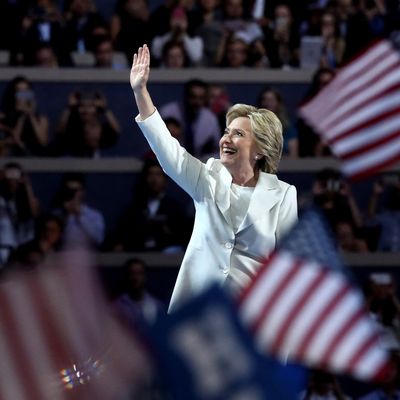
Earlier today, I laid out five things I thought Hillary Clinton needed to do in her nomination-acceptance speech tonight: Don’t get overshadowed; deal with the email “scandal;” embrace Bernie Sanders and his young supporters; identify with “safe change;” and frame the election as a choice of “two futures.”
I’d say she accomplished four of those five objectives, and added a bit more.
Nobody seems to rank Hillary Clinton’s convention speech with the president’s or the First Lady’s earlier this week. But, it didn’t clash with, or especially overlap with them, either, and thus did not lend itself to accusations that it diminished her or left her in their shadows.
She not only offered grace notes to Bernie Sanders and suggested the two campaigns’ co-operation on the platform could easily continue into the general election (“Your cause is our cause”), but in the agenda portion of the speech, she directly borrowed Sanders-style rhetoric, particularly on college tuition, Citizens United, and income inequality.
Facing the dilemma of emphasizing continuity with President Obama or burnishing her reputation as an advocate for change, she chose the second path with not much more than a sentence about the foundation the current administration had built. The domestic-policy agenda she laid out in the second half of the speech was forward-looking and keyed to the very economic fears that both Trump and Bernie Sanders have talked about. She also sounded suitably aggressive in her framing of national-security challenges. Her service in the Obama Administration was treated as a testimony to her toughness and experience rather than as a template for her priorities.
Given her decision not to even come close to running for “Obama’s third term,” it was appropriate that she spent a large portion of the speech framing the election as a “two futures” choice between two very different candidates. She noted Trump’s lack of any policy agenda with the requisite scorn; had great sport with his temperamental insuitability for the presidency (“A man you can bait with a tweet is not a man we can trust with nuclear weapons”); and joined other speakers from throughout the convention in mocking his ignorance of what he does not know.
But she did something else: reinforcing the theme of the third and fourth days of the convention that the “two futures” the two parties offer this November go beyond policy choices and executive capabilities to include very different visions of America and models for patriotism. Evoking what some have called the “politics of common purpose,” an old theme for her, Clinton very effectively built on Obama’s efforts last night to identify American values with an inclusive and collaborative approach to problem-solving that is both traditional and progressive — and far from the sort of white-identity politics and Bonapartist leadership Trump offers. Her speech was the culmination of a strong Democratic effort to invert Trump’s super-patriotism and rhetorically deport him as an alien presence in American politics.
Clinton chose not to address doubts about her honesty and trustworthiness generally, or the email scandal specifically. I think that may have been a mistake. But Team Clinton appears to have decided that the earlier testimonials to her constancy in pursuing her many policy goals and her devotion to the interests of families and children, did as much to restore her credibility as any assertions she could make about the murky details of her email protocols or the events at Benghazi.
Any way you look at it, Hillary Clinton ended the convention the leader of a (largely) united party that has appropriated much of the old Reagan–esque mood of optimism and patriotism Republicans long called their own, while avoiding a complacent agenda. She has probably earned as much of a public opinion “bounce” as Trump enjoyed immediately after his convention, and perhaps more, and has taken the fight to him in ways that could well provoke the kind of unforced errors at which he excels. The two candidates are so radically different that it almost takes an act of creative imagination to think of them as sharing a debate stage, which they will in September. The guerilla warfare between the two campaigns between now and then will be as raw and noisy as the music we heard in Cleveland, and now Philadelphia, when the balloons dropped and the prematurely triumphant hands were raised.






























